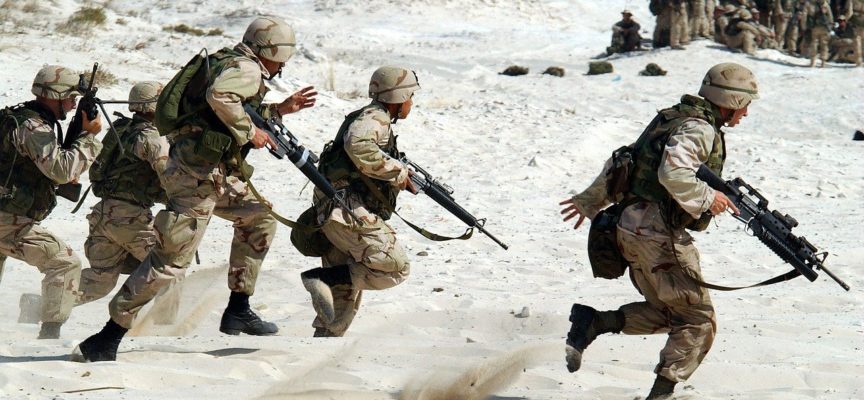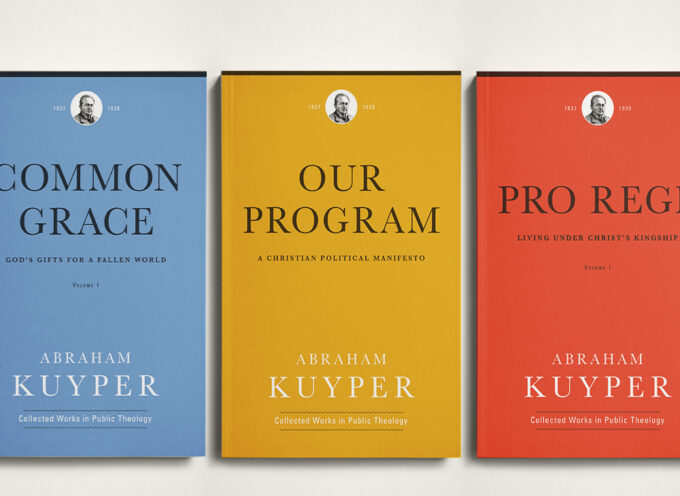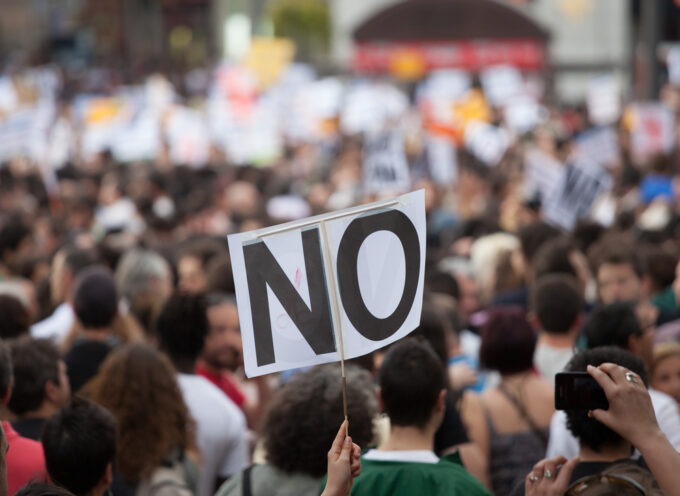There are few statements more mistaken than “all is fair in love and war.” The moral law applies in every context, including even on the battlefield. Thus, the just war tradition recognizes and affirms a moral symmetry between criteria for deciding whether or not to make war (“jus ad bellum”) and criteria for how to conduct the war (“jus in bello”).
In fact, the means of warfighting used by a military speak volumes about its true cause and intention. Additionally, a just peace cannot be gained if brought about by unjust means. In light of this fact, I offer seven criteria, drawn from the just war tradition, to guide concerned citizens, war commanders, or warfighters in thinking about moral conduct during the war.
1. Discrimination
The principle of discrimination is based on the conviction that indiscriminate slaughter cannot be justified. A just war is one in which soldiers distinguish between combatants and non-combatants, refusing to target noncombatants’ lives or property. In other words, in warfare, we are fighting against a state—with the state’s military as proxy—rather than against an entire society. A person is a combatant only to the extent that he or she willingly participates in the state’s wrongdoing.
2. Proportionality in the Use of Force
The just war tradition also demands that force be used proportionately. In a justly-waged war, a military does not use more force than necessary to achieve legitimate military goals. No action in war should be taken that generates more harm than good. As John Courtney Murray defines it, proportionate force is “the measure of power necessary and sufficient to uphold the valid purposes both of law and politics. What exceeds this measure is violence, which destroys the order both of law and politics.” Indeed, if the purpose of war is to bring justice, why cause injustice along the way? Thus, just warriors regulate their employment of force, and in so doing distinguish themselves jihadis and crusaders.
3. Avoidance of Evil Means
The avoidance of evil principle states that there can be no use of evil means, even for a just cause. “Undergirding the just war tradition,” Hall and Charles write, “are the baseline moral assumptions that coercive force must be severely qualified and that unjust means may not be employed to obtain a ‘just’ end.” Prohibited means should include any actions that are deemed inherently evil. In a justly-waged war, therefore, warfighters do not rape, pillage, and sexually abuse. They do not desecrate holy sites, mutilate the dead, destroy the crops, or target the civilians of the opposing nation.
4. Good Faith
The basic idea of the “good faith” principle is that, even in the midst of battle, enemy combatants should be treated as fellow human beings. It is to be presumed that opposing soldiers are, like one’s own army, following orders and risking their lives for something they value. The “good faith” principle, therefore, is related to right intent. Given that the purpose of a just war is an eventual just peace, good faith helps to keep open the possibility of reconciliation once hostilities have ceased.
5. Probability of Success
The probability of success principle states that we must not continue in war once we realize that our case is futile. In a justly-waged campaign, a political leader or military commander (whoever is responsible for conducting the battle) must refuse to continue fighting once it becomes clear that victory cannot be had and that a prolonged campaign would bring worse consequences than a cessation of war. In so doing, he saves as many lives as possible. This principle is part of what has led to the tradition of honorable surrender.
6. Proportionality of Projected Results
A just war is one in which a political leader or military commander (whoever is responsible for conducting the battle) must refuse to continue fighting, even though he could win the war, if a prolonged campaign would cost more than winning is worth. In so doing, he saves as many lives and as much property as possible.
7. Right Spirit
In a justly-waged campaign, soldiers engage in the morally justified killing of enemy combatants but do so with a spirit of regret rather than of glee. Every killing is a tragic necessity rather than a delight. Soldiers should regret having to kill or wound enemy soldiers even while using deadly force to stop enemy soldiers in battle. Augustine went so far as to argue that soldiers must love their enemy even while fighting the enemy. In his view just warriors exhibit a sort of “benevolent harshness” in that they employ violence not to extract revenge but to constrain the enemy combatants from further evil and to encourage them to embrace a just peace.
Conclusion
Each of these criteria follow naturally from the conviction we articulated in the previous post on the criteria of going to war. If going to war must be justified by God’s moral law, and this involves things like having a just cause and the right intent, then likewise as warfighters engage in war they must conduct themselves virtuously. If a war cannot be waged justly, it arguably should not be waged at all.
This is easier said than done, but God’s moral law is no entertainer of objections. The ethic that just war theory advocates for is the view that right and wrong do not change on the basis of what is expedient or would benefit the most people. Likewise, the criteria for just warfighting do not depend on whether one is a military aggressor or defender. Even if a nation is defending itself from attack, the aim must remain conduct oneself justly, for it is far better to strive for peace through just means than to transgress against God and man, regardless of the cost.
[Note: I am indebted to my former professor, Daniel Heimbach, for introducing me to these criteria. Dr. Heimbach served in the Navy before becoming an adviser to Bush 41. My initial conception and articulation of these criteria arises out of my interaction with him and his lecture notes.]
Other Articles in the “Ethics of Warfare” Series:
1. To Fight or Not to Fight? That is the Question.
2. What Kind of Peace Should America Seek in our War-Torn Era?
3. Why I am Peaceful but Not a Pacifist
5. Why I am a Proponent of the Just War Tradition
6. The “Founding Fathers” of the Just War Tradition
7. Seven All-Stars of the Just War Tradition
8. Eight Recent Champions of the Just War Tradition
9. 8 Criteria for Deciding When It’s Right to Go to War
10. 7 Moral Criteria to Guide Commanders during Battle
11. How Do Just War Principles Apply to Terrorism & Asymmetrical Warfare?
12. How Do Just War Principles Apply to Drone Warfare?
13. Future War: How do We Prepare Ethically for Radically New Forms of Warfare on the Horizon?
14. The Ethics of Special Operations Warfighting
Subscribe
Never miss a post! Have all new posts delivered straight to your inbox.








Bruce, I read this with some interest having been in the warfighting business, though never actually having seen combat.
History informs these issues by actual circumstances and expediencies. It is one thing to muse philosophically or even theologically but it needs to be illustrated by history or at least conversant with history. Wars fought against Nazi Germany and Imperial Japan severely challenged your recommendations on several fronts. Cast an eye to Vietnam and the present Middle East. So too, the ivory tower needs to be informed by the fighting hole or the trench. The high words and ideals here need to be informed by the mud and the blood of not musings but actions necessitated by trying to remain alive, on the personal level, the unit level, and the national level.
I am hoping that you have read beyond academia and have been informed by the soldier. If not I suggest Men Against Fire by SLA Marshall, With the Old Breed by Eugene Sledge (used as one of the sources of the series The Pacific, which I highly recommend), Band of Brothers (even though it is second person acccout) and The Battle of Hue City. Ray Clendenen and I have been reading Neptune’s Inferno: The US Navy at Guadalcanal for a look at the brutality and horror of surface ship combat (men walking the decks after an action tossing body parts overboard while munching an apple).
As a Marine NCO and Officer I heard lectures directed to your thinking but they were also informed by my older peers wearing Purple Hearts, and Navy Crosses and not a few Medals of Honor.
There is a danger of cloistering oneself in the ‘head shed’ and failing to walking the decks and visiting those in the trenches. The best chaplains in the military weren’t the great theologians or orators/preachers but the ones who muddied their boots with the troops in the field, ate their chow, and slept on the ground with them. Only then could anything they say later have any weight with the Marines in the mud.
Shawn,
Thank you for weighing in. These articles arise from the just war tradition and thus arises from warfighters and battlefield commanders as well as ethicists. And I am writing them specifically for two branches of our nation’s military and intelligence agencies with whom i consult. I’m trying to elucidate the principles that serve as the foundation for America’s LLW and ROEs. And, ultimately, since i come from a military family and am in constant conversation with chaplains, I know that many warfighters have the uncomfortable though in the back of their mind that killing is wrong and that they are guilty. My upcoming book will argue that the military and espionage vocations are honorable and can be carried out honorably. I hope that helps put the article in persepctive. I hope you are well and respect you for your service in the USMC. Best, Bruce